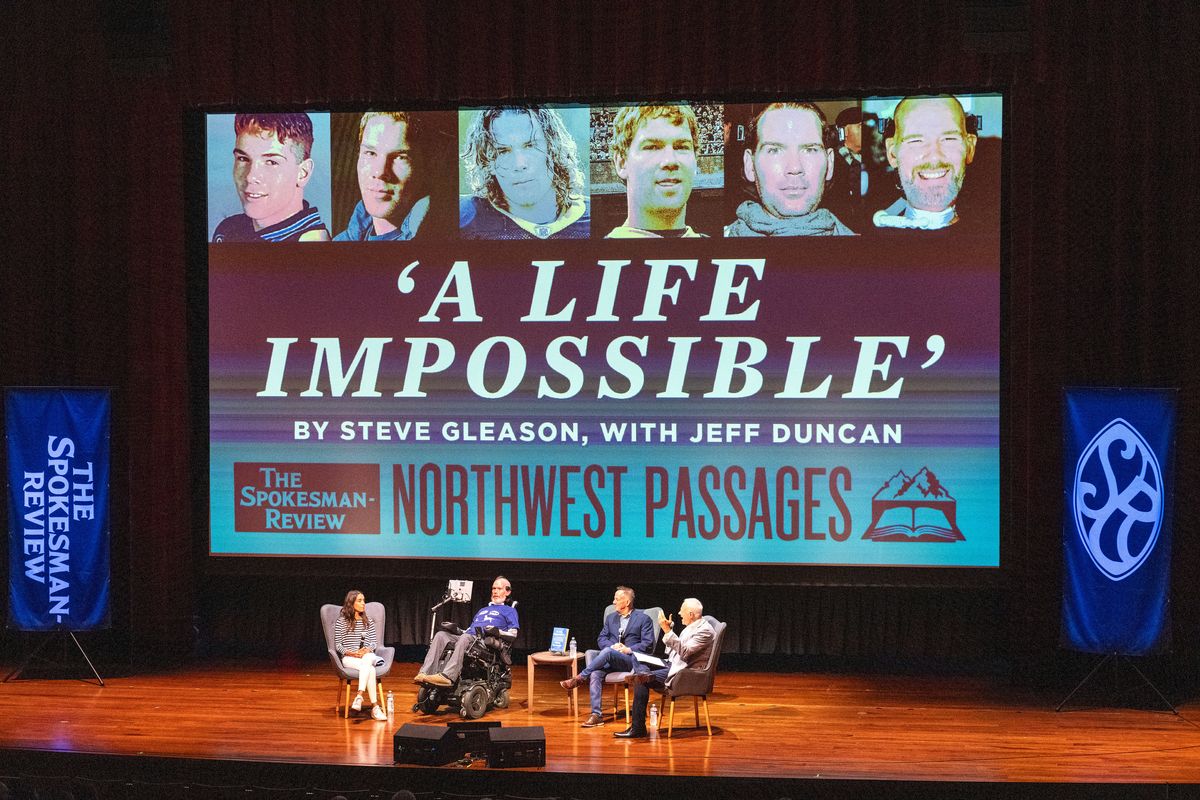Steve Gleason discusses faith, resiliency and the ‘ultimate human purpose’ while living with ALS

Unlike most other Northwest Passages guests, author Steve Gleason didn’t speak to his nearly packed, rapt audience on Sunday. At least not in the traditional sense.
Diagnosed with amyotrophic lateral sclerosis, commonly known as ALS, Gleason years ago lost the ability to move his body, talk or breathe without the assistance of devices like his wheelchair and a tablet and loved ones like his wife, Michel Varisco Gleason.
The former safety for the New Orleans Saints, who saw football beginnings playing for Washington State and Gonzaga Prep, returned to his hometown of Spokane on Sunday to discuss the book he wrote with the assistance of journalist Jeff Duncan and his wife, “A Life Impossible, Living with ALS: Finding Peace and Wisdom Within a Fragile Existence.”
He communicated with his audience in the same manner he wrote his novel, spelling words with infrared technology that tracks which letters he glances at on a keyboard in front of his face. His words are then broadcast with his own voice – he recorded 1,500 phrases prior to losing his ability to speak.
Though the disease stifled his words and movement, Gleason’s mind is as sharp as ever, as evident by his 20-chapter novel exploring themes of family, resiliency and faith.
“While my body has become a prison and I face an impossible adversity and immense challenges, each day, I have been able to survive and build a wonderful life by developing a personal formula for resilience,” Gleason’s recorded voice echoed around the auditorium. “I have learned to accept things that are out of my control, to transform suffering into strength and move through fear to fight peace and freedom. This is an existential freedom that can never be taken.”
Eternally dedicated, Michel Gleason has been by her husband’s side since his football years, through his diagnosis and assisting in writing his novel. She stretches her husband daily so he doesn’t get sore in his wheelchair, applies eye drops when his eyes dry and even tapes his eyes shut each night to sleep.
“It’s really difficult to imagine, unless you’re living with it, how difficult it is,” Michel Gleason said. “To not move is one thing, the difficult part is not being able to talk.”
It takes time for Steve Gleason to spell out his sentences, and sometimes his eyes tire or his technology falters, and he can’t express himself through his tablet. It’s especially difficult with their two children, son 12-year-old Rivers and daughter Gray, 5.
“Wanting to be present in their lives without being able to communicate in real time is impossible,” Michel Gleason said. “Every day it’s a real struggle. It’s a struggle for me on the other side, and I know it’s a struggle for him.”
At one point in the discussion, the gaps of silence between columnist Dave Boling’s questions and Steve Gleason’s queued answers stalled. The audience waited in breathless silence for Steve Gleason’s answer as Michel Gleason looked into his eyes, reading the directions of his glances to indicate different letters, a strategy when his technology fails.
She grabbed a tube of eye drops from off stage and dripped a few in his eyes to manually lubricate them, gently closing his eyelids with her fingertips.
“His eyes are struggling, and so the issue with his eyes right now is that he’s lost the ability to blink and close his eyes,” Michel Gleason said.
Once she gently wiped the excess lubricant dripping down his cheek, Steve Gleason was ready to answer more questions.
Grappling with his faith and spirituality in the midst of his declining bodily functions was one of Steve Gleason’s most vulnerable parts of his book, he said. His spiritual journey was influential to his understanding that though his body may be a “prison” to his philosophical mind, accepting his limitations affords him a fulfilling freedom.
“I’m starting to experience that my spirit is boundless, as long as I can acknowledge the limitations of my chaotic mind and physically useless body. From my experience, this freedom can lead us to move through suffering and find strength, resilience, solutions, as well as a profound sense of peace, compassion and love for other people,” Steve Gleason said. “I will assert that finding this freedom from discontent and suffering is our ultimate human purpose.”